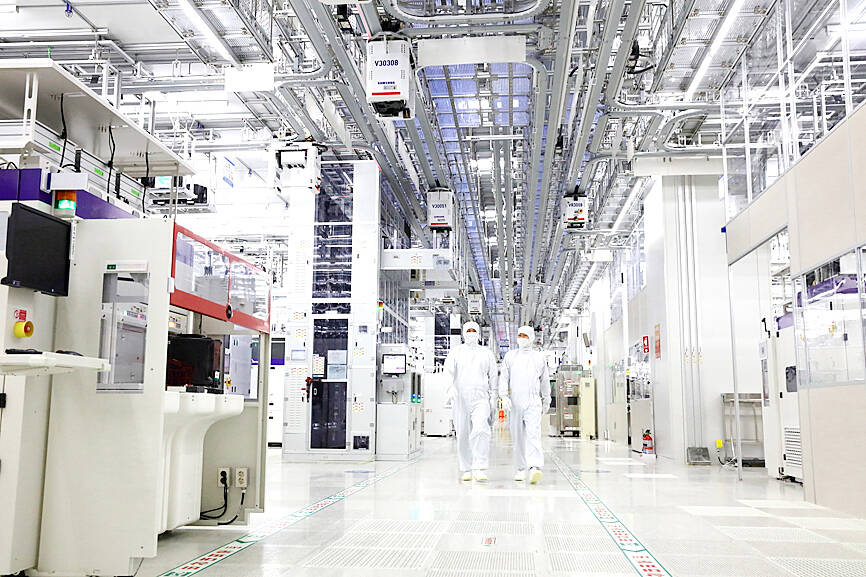A chip plant that South Korea’s Samsung Electronics Co is building in Taylor, Texas, would cost the world’s biggest memorychip maker more than US$25 billion, up more than US$8 billion from initial forecasts, three people familiar with the matter said.
The increase in cost is primarily due to inflation, the people said, declining to be named because the information is not public.
“The higher construction cost is about 80 percent of the cost increase,” one of the sources said. “The materials have gotten more expensive.”

Photo: Reuters
“The newly estimated cost could go up even more if the construction of the Taylor plant gets delayed,” a second source said, adding that the estimate could be fluid.
“The later the plant is completed, the higher cost we would be looking at,” they said.
Samsung did not immediately respond to a request for comment.
Chipmakers are applying for billions of US dollars in grants from US President Joe Biden’s administration through the Creating Helpful Incentives to Produce Semiconductors (CHIPS) and Science Act, aimed at ramping up chip production in the US.
However, increasing costs raise questions about how far those dollars will go. The bill was proposed in 2020, before a historic run-up in inflation that US officials are still working to tame.
Most US government grants would only cover up to 15 percent of the cost of new plants, US Department of Commerce officials said early this month.
In the three years since lawmakers first floated the US$52 billion figure for CHIPS Act grants, of which only US$39 billion is earmarked for direct investment in plant construction, the cost of labor has risen sharply, along with the price of construction materials such as steel.
That could push up the cost of what are already huge spending plans.
Last year, Taiwan Semiconductor Manufacturing Co (台積電), the world’s largest contract chip manufacturer, announced it was more than tripling a planned investment in a new plant in Arizona to US$40 billion.
Intel Corp announced a US$20 billion chip factory in Ohio that could cost up to US$100 billion, while Micron Technology Inc last year said that it planned to invest up to US$100 billion over the next 20-plus years to build a computer chip factory complex in upstate New York.
Samsung, the world’s No. 2 contract chip manufacturer, announced its Taylor plant in 2021.
It aims to make advanced chips for functions such as artificial intelligence, 5G and mobile phones, and promises to create 2,000 high-tech jobs.
Unlike some of its rivals, Samsung has already broken ground.
The company is rushing to finish the plant by next year so it can produce chips by 2025, which would put the company ahead of a 2026 deadline to secure investment tax credits on tools for the factory, one of the sources said.
Samsung has already spent as much as half of the US$17 billion initially projected for the Taylor site, two of the sources said.

ADVERSARIES: The new list includes 11 entities in China and one in Taiwan, which is a local branch of Chinese cloud computing firm Inspur Group The US added dozens of entities to a trade blacklist on Tuesday, the US Department of Commerce said, in part to disrupt Beijing’s artificial intelligence (AI) and advanced computing capabilities. The action affects 80 entities from countries including China, the United Arab Emirates and Iran, with the commerce department citing their “activities contrary to US national security and foreign policy.” Those added to the “entity list” are restricted from obtaining US items and technologies without government authorization. “We will not allow adversaries to exploit American technology to bolster their own militaries and threaten American lives,” US Secretary of Commerce Howard Lutnick said. The entities

‘SWASTICAR’: Tesla CEO Elon Musk’s close association with Donald Trump has prompted opponents to brand him a ‘Nazi’ and resulted in a dramatic drop in sales Demonstrators descended on Tesla Inc dealerships across the US, and in Europe and Canada on Saturday to protest company chief Elon Musk, who has amassed extraordinary power as a top adviser to US President Donald Trump. Waving signs with messages such as “Musk is stealing our money” and “Reclaim our country,” the protests largely took place peacefully following fiery episodes of vandalism on Tesla vehicles, dealerships and other facilities in recent weeks that US officials have denounced as terrorism. Hundreds rallied on Saturday outside the Tesla dealership in Manhattan. Some blasted Musk, the world’s richest man, while others demanded the shuttering of his

Minister of Finance Chuang Tsui-yun (莊翠雲) yesterday told lawmakers that she “would not speculate,” but a “response plan” has been prepared in case Taiwan is targeted by US President Donald Trump’s reciprocal tariffs, which are to be announced on Wednesday next week. The Trump administration, including US Secretary of the Treasury Scott Bessent, has said that much of the proposed reciprocal tariffs would focus on the 15 countries that have the highest trade surpluses with the US. Bessent has referred to those countries as the “dirty 15,” but has not named them. Last year, Taiwan’s US$73.9 billion trade surplus with the US

Prices of gasoline and diesel products at domestic gas stations are to fall NT$0.2 and NT$0.1 per liter respectively this week, even though international crude oil prices rose last week, CPC Corp, Taiwan (台灣中油) and Formosa Petrochemical Corp (台塑石化) said yesterday. International crude oil prices continued rising last week, as the US Energy Information Administration reported a larger-than-expected drop in US commercial crude oil inventories, CPC said in a statement. Based on the company’s floating oil price formula, the cost of crude oil rose 2.38 percent last week from a week earlier, it said. News that US President Donald Trump plans a “secondary